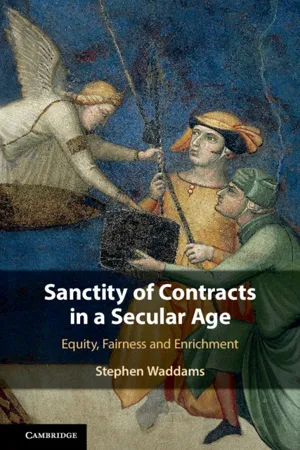
- English
- PDF
- Available on iOS & Android
About this book
The phrase 'sanctity of contracts' implies that contracts should always be strictly enforced. But when this objective is relentlessly implemented ruinous burdens are sometimes imposed on one party and extravagant enrichments conferred on the other. Despite recognition of the need to control highly unreasonable contracts in various particular contexts, there remain many instances in which the courts have refused to modify unreasonable contracts, sometimes with extravagant results that are avowedly 'grotesque'. In the computer age assent may be inferred from a click on a screen in the absence of any real agreement to the terms, which are often very burdensome to the user. In this book, arguments are advanced in favour of recognition of a general judicial power to relieve against highly unreasonable contracts, not only for the benefit of the disadvantaged party, but for the avoidance of unjust enrichment, and for the avoidance of anomalous gaps in the law.
Frequently asked questions
- Essential is ideal for learners and professionals who enjoy exploring a wide range of subjects. Access the Essential Library with 800,000+ trusted titles and best-sellers across business, personal growth, and the humanities. Includes unlimited reading time and Standard Read Aloud voice.
- Complete: Perfect for advanced learners and researchers needing full, unrestricted access. Unlock 1.4M+ books across hundreds of subjects, including academic and specialized titles. The Complete Plan also includes advanced features like Premium Read Aloud and Research Assistant.
Please note we cannot support devices running on iOS 13 and Android 7 or earlier. Learn more about using the app.
Information
Table of contents
- Cover
- Half-title page
- Title page
- Copyright page
- Contents
- Preface
- Table of Cases
- 1 Introduction
- 2 Concepts Derived from Equity
- 3 Duress
- 4 Interpretation and Implied Terms
- 5 The Limits of Enforcement
- 6 Conclusiveness of Documents in the Digital Age
- 7 Unconscionability, Good Faith and Abuse of Rights
- 8 Unjust Enrichment
- 9 Law and Equity
- 10 Judicial Powers in Relation to Legislation
- 11 Judgment, Powers and Discretion
- 12 Public Policy
- 13 Conclusion
- Index